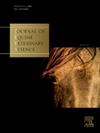Mild radiographic abnormalities of thoracolumbar spinous processes are not associated with decreased performance in 100 Warmblood jumping horses in active competition
IF 1.3
3区 农林科学
Q2 VETERINARY SCIENCES
引用次数: 0
Abstract
Back pain is a common cause of poor performance in horses. However, the relationship between clinical signs and radiographic abnormalities is unclear. The aim of this study was to report radiographic findings of spinous processes in a population of Warmblood jumping horses and their association with performance. This was a descriptive observational study. One hundred Warmblood jumping horses (competing fence height: median 1.35 m, mean 1.3 m, range 0.90m-1.60 m), with no observed lameness and neurological signs, competing in 2018 were selected. Radiographs of spinous processes of the thoracolumbar region were taken and graded for presence of narrowed interspinous space, sclerosis, lucency and enthesopathy (absent, mild, moderate-severe) by four observers. The agreement between the four observers was studied by using the Intraclass Correlation Coefficient. Signalment, current level of performance, highest career level and years of competition were recorded and their correlation with radiographic abnormalities was analyzed.
There were no horses without radiographic abnormalities in this study. Agreement between observers was moderate-good. Narrowed interspinous spaces and sclerosis were common and mainly found between T15-L1, while enthesopathy was mainly found at the withers (T8-T13). Highest career level was positively correlated with narrowed interspinous spaces (r = .21, p = 0.037) and sclerosis (r = .21, p = 0.034). Current level of performance, age and years of competition did not significantly correlate with presence of radiographic abnormalities (p > 0.05).
In conclusion, mild radiographic abnormalities of spinous processes of the thoracolumbar spine were common in the current study population of Warmbloods in active jumping competition but did not necessarily negatively affect performance.
求助全文
约1分钟内获得全文
求助全文
来源期刊

Journal of Equine Veterinary Science
农林科学-兽医学
CiteScore
2.70
自引率
7.70%
发文量
249
审稿时长
77 days
期刊介绍:
Journal of Equine Veterinary Science (JEVS) is an international publication designed for the practicing equine veterinarian, equine researcher, and other equine health care specialist. Published monthly, each issue of JEVS includes original research, reviews, case reports, short communications, and clinical techniques from leaders in the equine veterinary field, covering such topics as laminitis, reproduction, infectious disease, parasitology, behavior, podology, internal medicine, surgery and nutrition.
 求助内容:
求助内容: 应助结果提醒方式:
应助结果提醒方式:


